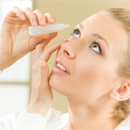 Do you have dry, itchy, red, stinging eyes that seem impossible to soothe? If you’ve ever experienced dry eyes, you know just how uncomfortable it can be. Dry eyes are caused by a lack of lubrication of the eye by tears. Tears are made up of water, fatty oils, proteins and electrolytes. This mixture helps to make the surface of your eyes smooth and clear and is important for eye protection.
Do you have dry, itchy, red, stinging eyes that seem impossible to soothe? If you’ve ever experienced dry eyes, you know just how uncomfortable it can be. Dry eyes are caused by a lack of lubrication of the eye by tears. Tears are made up of water, fatty oils, proteins and electrolytes. This mixture helps to make the surface of your eyes smooth and clear and is important for eye protection.
If you are suffering from dry eyes, your eye health is at risk. Dry eyes decrease eye protection which can lead to damage of the eyes, including more frequent eye infections, ulcers of the cornea and scarring of the surface of your eye. It is important to establish the cause of your dry eyes and determine the best treatment for optimal eye health. There are a number of reasons why you may be experiencing dry eyes, including:
Advertisement
1. Side effects of certain drugs, most commonly antihistamines and birth control pills
2. Aging – dry eyes are common in post-menopausal women
3. Diseases that affect your ability to produce tears – lupus, rheumatoid arthritis, etc.
4. Problems with the structure of your eyelids – eyelids that turn in or out affect your ability to blink which interferes with the lubrication of your eyes
5. Exposure to environmental conditions – high wind, high altitude, smoke and sun damage all affect your eyes
Be sure to talk to your eye doctor about all of your symptoms as well as all possible factors that you think may be playing a role in your dry eyes.
Prevention of Dry Eyes
If you aren’t experiencing dry eye, there are steps that you can take to prevent suffering from this condition in the future, including:
– Avoid sun damage to your eyes by using proper eye protection (sunglasses that protect against both UVA and UVB rays). For the best protection against sun damage, ensure that your sunglasses wrap around your entire eye
– Consider eyeglass shields (shields on the sides and tops of your glasses) for added eye protection from sun damage
– Avoid smoke and high winds whenever possible. Wearing eye protection when you are exposed to these environmental elements will help to protect your eyes from the wind and smoke and will also help to protect them from sun damage
Related Article: Easy Tips to Protect Your Eyes
Self-Care Options for Dry Eyes
There are a number of self-care options that you can try at home to relieve the symptoms of dry eyes including:
– Adding artificial tears with prescription or over-the-counter eye drops
– Washing your eyelids to reduce inflammation
If these self-care options do not help with your dry eyes, be sure to visit your eye doctor to get the problem taken care of. If you leave dry eyes untreated, your eye health is at risk.
Medical Treatment for Dry Eyes
Depending on the cause of your dry eyes; your eye doctor will suggest a treatment option that is right for you. Some of the treatment options that are available include:
– Medications – eye drops, topical steroids, etc.
– Closing your tear ducts to reduce tear loss – this can be done temporarily or permanently
– Surgery – if more conservative measures don’t work
It is best to speak with your eye doctor to determine the cause and the best treatment for your dry eyes and to learn what will improve your eye health.
By protecting your eyes from factors that you can control, including wind and sun damage you are taking the first step for eye health. Additionally, seeing your optometrist regularly will help to ensure your eye health remains optimal.
Advertisement
Related Reading:
Spring allergies? Natural solution for dry eyes
Computer vision syndrome: Smart tips to beat smartphone stress
